|
|
|
Sort Order |
|
|
|
Items / Page
|
|
|
|
|
|
|
| Srl | Item |
| 1 |
ID:
184173
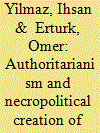

|
|
|
|
|
| Summary/Abstract |
One of the most widely used and influential ways of creating foundational myths for authoritarian legitimation is to construct a necropolitical narrative around the significance of dying for the nation, homeland, state and the leader, i.e. martyrdom. Mbembe’s concept ‘necropolitics’ (the right of the sovereign to determine who shall live and who shall die) has been expanded to include the pollical instrumentalization of martyrdom narratives. However, the literature has not analyzed the necropolitical martyr-icons. This paper aims to address this gap by looking at two historical episodes in Turkey, one in the 1930s dominated by secularists and post-2016 dominated by Islamists.
|
|
|
|
|
|
|
|
|
|
|
|
|
|
|
|
| 2 |
ID:
169326


|
|
|
|
|
| Summary/Abstract |
Since the Turkish government’s recent turn to authoritarianism, tens of thousands of public dissidents and government critics have been subjected to dismissals and revocation of civic rights via emergency decrees. The victims call this process ‘civil death’. We aim to understand the logic behind this form of punishment in Turkey by examining the differential genealogy of civil death in the work of Hannah Arendt, Bertrand Ogilvie, Giorgio Agamben, and Achille Mbembe. We demonstrate that a later form of civil death was used by totalitarian regimes in a process leading to the reduction of targeted individuals as ‘superfluous’ and as ‘living corpses’ in concentration camps. In these contexts, death became an instrument of biopolitical and necropolitical powers. We propose that although contemporary punishment of public dissidents in Turkey shares some similarities with these forms of civil death, it may more fittingly be identified as civic death. We argue that while civil death is based on the classical political right of the sovereign to ‘make die’ after first reducing targeted individuals to little more than living corpses, civic death is linked to the power of the sovereign to ‘let die’ through the exclusion of public dissidents from economic, social, and political life.
|
|
|
|
|
|
|
|
|
|
|
|
|
|
|
|
| 3 |
ID:
183703
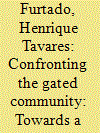

|
|
|
|
|
| Summary/Abstract |
This article investigates the works of Dussel, Maldonado-Torres, and Mbembe as representatives of a tendency in the field of decolonial thought to assume the templates of warfare and the camp as the archetypal registers of violence in the contemporary world. Identifying this focus as the remnant of a Eurocentric vocabulary (the paradigm of war), the article proposes a shift from the language of warfare predominant in the field to a language of welfare. The article turns to the gated community (GC), instead of the camp, and the imperatives of (re)creation, instead of the logics of elimination, as new templates with which to make sense of modern/colonial violence. Moving beyond militaristic imagery, the analysis shows a form of violence that emerges as a response to the endless search for a life of convenience inside the walls of the GC. To this end, the article advances the concept of the dialect of disarrangement, the enforced but uneasy encounter between two subjectivities that inhabit the GC: the patrons (the homeowners who consume the easy life) and servants (the racialised service staff). In the GC, violence emerges in attempts to respond to this (in)convenient encounter via misrepresentations of both patrons and servants as out of their place.
|
|
|
|
|
|
|
|
|
|
|
|
|
|
|
|
| 4 |
ID:
174255
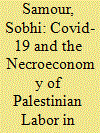

|
|
|
|
|
| Summary/Abstract |
The situation of West Bank Palestinians working in Israel has highlighted a number of parallels with the conditions of global labor employed in essential sectors during the Covid-19 pandemic. Under capitalism, the compulsion to work, ostensibly to cultivate life, comes at the risk of being exposed to death, but is preferred over immiseration caused by unemployment. The pandemic has merely amplified existing structural features of such employment. For Palestinian workers, with the risk of infection in Israel being significantly higher, the perilous conditions experienced by Palestinian labor have turned the preservation of life enabled by such employment more firmly into the production of death. The Palestinian Authority (PA), too, faces a conundrum: to balance the economic benefits it derives from Palestinian disposability in the Israeli labor market with public health considerations limiting such employment. This essay argues that the Covid-19 pandemic lays fully bare the necroeconomy produced by the intersection of settler colonialism and capitalism, which also forms the bedrock of the necropolitical order in the West Bank.
|
|
|
|
|
|
|
|
|
|
|
|
|
|
|
|
| 5 |
ID:
177054


|
|
|
|
|
| Summary/Abstract |
What can the poetry chosen for epitaphs on graves tell us about the political and cultural development of post-revolutionary Iran and the politics of death and dying under the Islamic Republic? This article explores contemporary Persian epitaph poetry as a valuable medium for understanding the socio-political dynamics of Iranian society. By analyzing the epitaphs of the Iran–Iraq war martyrs, who are buried in Zahra’s Paradise public cemetery in Tehran (Behesht-e Zahra), a new nomenclature can be established for the religious, political and socio-cultural ideas underpinning death and the afterlife.
|
|
|
|
|
|
|
|
|
|
|
|
|
|
|
|
| 6 |
ID:
190218
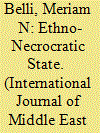

|
|
|
|
|
| Summary/Abstract |
Using the unique and historic Islamic cemetery of Mamillah in Jerusalem as a primary example, this essay discusses the ethno-necrocratic order that led to the 2008 Israeli High Court of Justice's codification of the supremacy of Jewish bodies and afterlives over non-Jewish ones, on the basis of advancing Israel's values. Hundreds of Palestinian burial grounds, starting with village cemeteries, have been destroyed since 1948. Indeed, funerary sites have testified to the omnipresence and millenarian existence of a population that the state has sought to erase from memory. In a few decades, the deathscape was radically altered, in cities as in the countryside. Although real estate corruption plagues Israeli politics, land use planning and real estate capitalism are inseparable from the ethno-racial politics of exclusion, which affect both the dead and the living.
|
|
|
|
|
|
|
|
|
|
|
|
|
|
|
|
| 7 |
ID:
124627
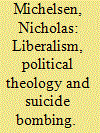

|
|
|
|
|
| Publication |
2013.
|
| Summary/Abstract |
This article sets out to interrogate the relationship between Liberalism and suicide bombing. It maps and critically examines accounts of suicide bombing as a practice diametrically opposed to the secular logics of liberal governance, or as the direct expression of the traces of sovereign exceptionalism that haunt the global operation of Liberal biopower. I argue that a uniquely liberal analytic of human finitude establishes conditions of political intelligibility for suicide bombings today. As such, the contemporary politics of suicide may be understood as in critical communication with liberal political theologies of immanent governance over the human qua mortal, rather than as structurally deriving from political theologies of sovereign power.
|
|
|
|
|
|
|
|
|
|
|
|
|
|
|
|
| 8 |
ID:
172135
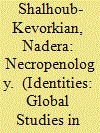

|
|
|
|
|
| Summary/Abstract |
In theorising penal politics, this article investigates the marking of the colonised through an analysis of state violence over dead bodies. Delving into and describing the political scene in which the state – through its courts, law, military, and police – leaves dead bodies bleeding after death, withholds them in carceral refrigerators, and tortures their communities, uncovers what I define as necropenology. Developed from the voices of Jerusalemite families whose children were imprisoned after death, this paper argues that expanding spaces of carcerality, criminalising those who are already dead, and penetrating Palestinian spaces of mourning, illustrates new modes of penology, a necropenology. Necropenology conquers new bodies, psychics, and territories in life and in death through the performance of power that marks both dead and living bodies as disposable. Jerusalemite families articulate first-hand how this form of power strips control of one’s own emotions, inscribes indignities, and keeps the colonised as dangerous entities, always on trial in death and when dead.
|
|
|
|
|
|
|
|
|
|
|
|
|
|
|
|
| 9 |
ID:
193008
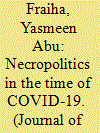

|
|
|
|
|
| Summary/Abstract |
The COVID-19 pandemic reached all parts of historic Palestine around the same time, but by the end of December 2021, only 29.02 percent of Palestinians in the West Bank and Gaza were fully vaccinated compared to 63.82 percent of Israelis (including Palestinians with Israeli citizenship). The mortality rate from COVID-19 in the West Bank and Gaza was also higher, with 941.84 deaths per million, compared to 887.20 in Israel. This essay argues that these differences are a direct result of Israel’s COVID-19 response policies toward the Palestinians throughout the pandemic, as well as its ongoing siege of Gaza and its military occupation of the West Bank, including East Jerusalem. The analysis is framed through the lens of necropolitics, defined as the use of political power to decide who lives and who dies. Using the four waves of the COVID-19 pandemic across historic Palestine as a case in point, the essay focuses on the different political states in which Israel abused necropolitical power: the states of emergency, exception, siege, and acceptance.
|
|
|
|
|
|
|
|
|
|
|
|
|
|
|
|
| 10 |
ID:
185905


|
|
|
|
|
| Summary/Abstract |
The Austrian Parliament has passed three laws since 2018 that prohibit wearing Muslim body-coverings in public. This departure from a formerly tolerant approach is an outcome of ongoing anti-Muslim campaigns by the radical-right populist Freedom Party of Austria (FPÖ). The party has been mobilising since the mid-1980s through the creation of two antagonisms: ‘the elite’ and second against ‘Others’ – mainly migrants. Since the turn of the century, this anti-migrant mobilisation has targeted the intersection of gender and religion by focusing on veiled Muslim women. Targeting this intersection of gender and religion, the article applies a critical frame analysis of 19 FPÖ documents from 2006 to 2020 on restrictive rulings about female Muslim body-covering. It finds that Austrian radical right populist campaigns emphasise the female body and construct the Austrian ‘people’ (biopolitics), while necropower constructs Muslim migrants as non-belonging, excludable, and erasable.
|
|
|
|
|
|
|
|
|
|
|
|
|
|
|
|
| 11 |
ID:
190794


|
|
|
|
|
| Summary/Abstract |
This study explores the post-9/11 ramifications of the Global War on Terror (GWOT) in South Waziristan, Pakistan. It discusses how the post-colonial state has undermined state and tribal political relations which constituted political order first during the British colonial era and later in Pakistan. Furthermore, it explores how the post-colonial state has shared de facto sovereignty in the region with a “good” Taliban in the shape of a peace committee. To understand the Pakistan post-colonial state’s engagement with South Waziristan, it is necessary to make sense of the ongoing GWOT and the resulting necropolitics of life and death in South Waziristan. The paper explores how residents have confronted different scenarios when they encounter the new powerholders. It details the everyday experiences, life stories, and socio-political existence of the people of South Waziristan as an alternative narrative to how mainstream media and academic sources have discussed this area.
|
|
|
|
|
|
|
|
|
|
|
|
|
|
|
|
|
|
|
|
|